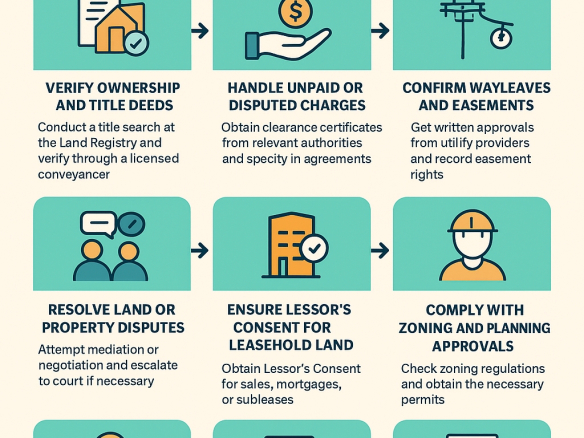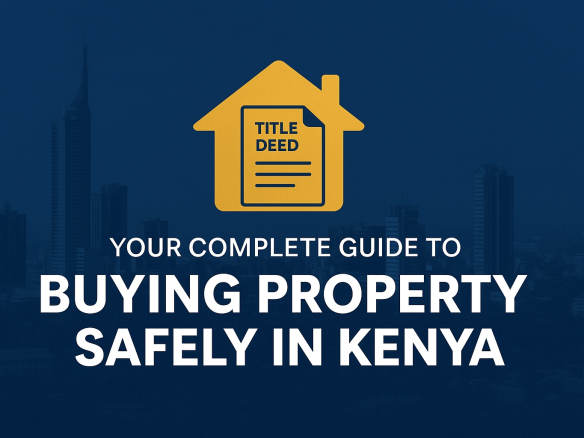Real Estate Investment in Kenya: Where to Begin and What You Should Know
Kenya’s real estate sector has experienced significant growth in recent years, driven by urbanization, a growing middle class, infrastructure development, and increased demand for both residential and commercial properties. If you’re considering investing in real estate in Kenya, it’s important to approach the market with a clear understanding of the landscape, the opportunities, and the challenges. Here’s a guide to help you get started and make informed decisions.
1. Understand the Kenyan Real Estate Market
Kenya’s real estate market is diverse, with opportunities across various segments including residential, commercial, industrial, and land investment. Different regions of the country present different investment opportunities, so it’s crucial to understand the current dynamics in each area.
Key Trends to Know:
- Urbanization: Nairobi, Mombasa, Kisumu, and Nakuru are seeing rapid urban growth, leading to an increased demand for housing, office spaces, and retail centers. Nairobi is the largest market for real estate in Kenya, and there’s high demand for both high-end and affordable housing.
- Middle-Class Growth: As Kenya’s middle class expands, there is an increasing demand for modern housing, especially in urban areas.
- Infrastructure Development: Major infrastructure projects like the Nairobi Expressway, Lamu Port, and Standard Gauge Railway (SGR) have boosted property values in some areas, particularly around transportation hubs and new development zones.
- Commercial Real Estate: There is demand for office spaces in Nairobi’s Central Business District (CBD) and in emerging commercial hubs in suburbs like Westlands, Kilimani, and Upper Hill.
- Vacation Homes & Short-Term Rentals: Coastal cities like Mombasa and Kilifi, as well as Nairobi, have seen increased demand for short-term rental properties, particularly for international tourists and business travelers.
2. Choose Your Investment Type
There are several ways to invest in real estate in Kenya, depending on your budget, goals, and risk appetite. Here are the most common options:
a. Residential Property Investment
- Target Audience: Middle-class buyers and renters, expatriates, young professionals, and families.
- Opportunities: Apartments, townhouses, and standalone homes in urban areas like Nairobi, Mombasa, Kisumu, and Kisumu.
- Renting vs. Flipping: You can either buy property for long-term rental income or renovate and flip the property for capital gains.
- Emerging Areas: Areas like Ruiru, Kitengela, Ngong, Kajiado, and Thika Road are seeing rising demand as middle-income earners move farther out of Nairobi in search of more affordable housing.
b. Commercial Real Estate
- Target Audience: Businesses, corporations, and institutions.
- Opportunities: Office buildings, retail spaces (like malls and showrooms), and warehouses. Nairobi’s CBD, Westlands, Kilimani, and Upper Hill are prime commercial districts.
- Renting or Leasing: Commercial spaces are typically leased on longer-term contracts (5 to 10 years), providing more stability.
- Demand: There is increasing demand for co-working spaces, especially post-pandemic, as businesses move towards flexible working arrangements.
c. Land Investment
- Target Audience: Long-term investors and developers.
- Opportunities: Purchasing undeveloped land in urban or peri-urban areas. Land can be a great long-term investment, especially in fast-developing areas or near major infrastructure projects like new roads, railways, or ports.
- Rural Land: Land in rural areas can be used for farming or future development, but it requires significant capital for development and often comes with challenges related to access to utilities and services.
- Zoning: Ensure you check the land’s zoning regulations before purchasing, as some areas may be restricted for specific uses (e.g., agricultural land vs. residential).
d. Vacation Homes/Short-Term Rentals
- Target Audience: International and local tourists, business travelers.
- Opportunities: Investing in vacation rental properties (e.g., Airbnb, VRBO) along Kenya’s coastline (Mombasa, Diani, Kilifi), in Nairobi, or in upmarket towns like Naivasha and Nanyuki.
- Why it works: Kenya’s tourism industry continues to attract both international and domestic visitors. Properties in popular tourist destinations can yield high returns, especially when rented out on a short-term basis.
3. Understand the Legal and Regulatory Framework
Kenya’s real estate sector has seen significant regulatory reforms in recent years, but it’s still crucial to understand the key legal aspects when investing in property.
Key Legal Considerations:
- Title Deeds: Ensure the property has a legitimate title deed (either a Freehold Title or Leasehold Title) registered with the Lands Ministry. Avoid land with unclear ownership or potential disputes. Always seek advice from a lawyer to verify the title.
- Land Rates & Taxes: Real estate transactions in Kenya are subject to several taxes, including stamp duty (4% for residential, 6% for commercial) and capital gains tax (at 5% on net gains when selling property).
- Property Valuation: Conduct a proper valuation through a certified valuer to ensure the property is worth the price you’re paying.
- Land Use & Zoning: Verify the zoning of the land and check for any restrictions that may limit its intended use. This is particularly important for land that you plan to develop.
- Sellers’ Legitimacy: Before entering a deal, confirm that the seller has the right to sell the property and that all taxes and rates have been paid.
- Regulatory Authorities: The National Land Commission (NLC) and Kenya Property Developers Association (KPDA) are responsible for overseeing land and property development activities in the country.
4. Consider Financing Options
The real estate market in Kenya has grown more accessible with various financing options available, although they may still be relatively limited compared to other countries.
Financing Options:
- Bank Mortgages: Banks like Kenya Commercial Bank (KCB), Cooperative Bank, and Equity Bank offer mortgages for residential and commercial property. Mortgage rates in Kenya range from 10% to 14%, and most banks require a 10% to 30% down payment.
- Developer Financing: Some developers offer financing plans for new residential properties, where you can pay in installments until construction is complete. This can be ideal for first-time buyers.
- Joint Ventures: Some investors pool resources through joint ventures (JVs) or partnerships to purchase larger properties or land. This is common in commercial real estate or large-scale land development projects.
Alternative Financing:
- M-Pesa and Mobile Loans: Mobile money platforms like M-Pesa have made it easier to transfer money or secure small loans for purchasing property. However, these are generally better suited for smaller investments.
- Real Estate Investment Trusts (REITs): REITs allow you to invest in real estate without directly owning property. The Nairobi Securities Exchange (NSE) has several publicly listed REITs that allow investors to buy shares in real estate portfolios.
5. Research the Market and Choose the Right Location
Kenya’s real estate market is heavily influenced by location. Some areas are experiencing rapid growth, while others are facing challenges related to oversupply, infrastructure, or political instability.
Best Areas for Investment:
- Nairobi: The capital city remains the primary real estate investment hub, with areas like Westlands, Upper Hill, Kilimani, Karen, Lang’ata, and Ruiru offering good potential for both residential and commercial investments.
- Mombasa: As Kenya’s second-largest city and coastal tourism hub, Mombasa’s real estate market is driven by tourism, commercial, and residential demand, particularly around areas like Nyali, Diani, and Shanzu.
- Nakuru: The demand for residential housing in Nakuru is increasing due to its proximity to Nairobi and its growing population, making it an ideal location for mid-range residential properties.
- Kisumu: As the third-largest city in Kenya, Kisumu is experiencing growth due to its strategic location on Lake Victoria, making it a great area for commercial and residential property investments.
6. Due Diligence and Property Inspections
Before purchasing any property, it’s crucial to conduct thorough due diligence. This includes:
- Title Search: Verify the property’s title deed with the relevant land registry.
- Physical Inspection: Ensure the property is in good condition. For commercial or residential buildings, check for structural integrity and compliance with local building codes.
- Legal Check: Ensure the property has no outstanding disputes, encumbrances, or debts attached to it.
Conclusion: Start Small, Grow Strategically
While Kenya’s real estate market offers great opportunities, it also comes with risks—particularly for first-time investors. To get started, it’s advisable to:
- Focus on properties that align with your budget and long-term goals.
- Work with trusted local agents, lawyers, and property managers to navigate the legal and operational complexities.
- Begin with smaller, manageable investments (e.g., a single-family home or apartment) before scaling up to larger projects.
- Stay informed about market trends and infrastructure developments that can impact property values.
With careful research, good due diligence, and strategic decision-making, you can tap into the potential of Kenya’s real estate sector and achieve a successful investment outcome.





Join The Discussion